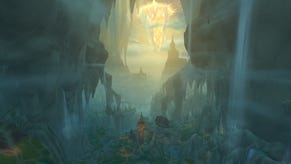Keita Takahashi on Wattam and the Superfluousness of Video Games
Katamari and Wattam designer Keita Takahashi may not be able to change the world with video games, but he hopes to make it a touch brighter.
This article first appeared on USgamer, a partner publication of VG247. Some content, such as this article, has been migrated to VG247 for posterity after USgamer's closure - but it has not been edited or further vetted by the VG247 team.
At PAX West, the atmosphere is a cacophony of game noises and people excitedly yammering about what demos they stood hours in line to play for 15 minutes. It feels closed off from the outside world, mostly; an escape from the constant drama of politics, but anxious all the same considering the horrific Jacksonville shooting at a Madden tournament mere days earlier. For game designer Keita Takahashi, it adds to the apathy in, well, working today in the games industry.
"You know, what's happening right now [in] the United States especially, my complex about making a video game is the 'video game' is unnecessary, I think, for our life," he tells me. "Right now I'm living in San Francisco, and the [Funomena] studio is downtown. So every morning I walk from the station to the studio office. There are many homeless people. I know, it's not only about the United States. But," he takes a deep sigh, "What I'm doing is making a video game because I like making the video game, or I like making something. But the video game is not for everyone. The difference in financial. [sic] So TV, console, couch, and window. Comfortable temperature. That's kind of very luxury thing. That makes me think about yeah, 'What should I do?' I can't make a video game for just, for fun. Because making the video game is fun, but yeah, I'm still doubting what I'm doing. I need to think about more than just making fun video games."
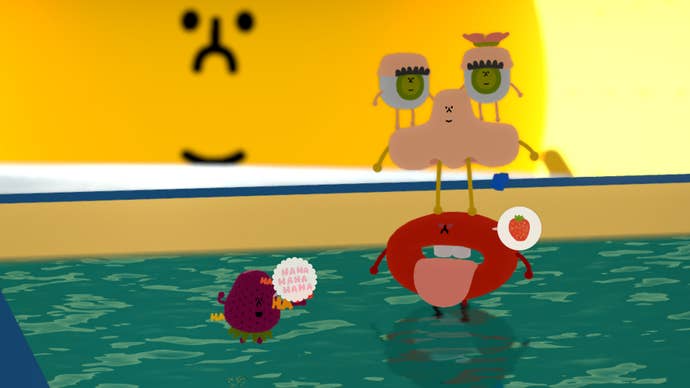
Takahashi's latest game is Wattam, a game he explains is "about respect for all life." But our conversation about it is accented as much by laughter as it is somberness. Light-hearted observations and answers derail onto grim paths. I understand the tendency. When I wake up and browse the news, I feel guilt when I have to turn my attention towards video games; towards something that feels trivial after reading about mass shootings or the President of the United States discounting the high death toll from a natural disaster.
As a game creator known for some of the most lively games ever made, Takahashi feels the fatigue of so much negativity probably more than most of us. Not even some of the most beloved games of 2017 have been enough to lift him up at times. He recently picked up a Nintendo Switch to play Super Mario Odyssey and The Legend of Zelda: Breath of the Wild. Contrary to most around the industry, he was disappointed in them. "It's not fun for me," he says of Zelda. He notes that the "gap between story and the system" got in the way of his enjoyment. "Yeah that bothered me, then I stopped playing. Then Mario, I was so excited about the new Mario but," he makes a downward motion with his hand and laughs, "after I finished Mario, I just turned off the Switch, I have never turned [it] back on. But I played The Last Guardian, finally. That was good. I know some complained but I really respect [Fumito] Ueda-san."
But there's still positivity out there that keeps him going, and he's as humble as you can imagine for a guy making a game about sentient poops and toilets.
"After I quit Namco, I moved to Vancouver. There everything's different from Tokyo and Japan. So many people—like the Chinese, Indian, Korean, European—speak their own language, but they speak English in Vancouver. They work together. That's kind of impressive for me," says Takahashi. "I'm thinking that I knew we still have some issues, like many issues on our planet [sic]. So I know, I can't solve the issues by making a video game. But I try. Somehow I got the idea of the game about getting over differences by something fun, which is explosion."
And a lot's changed in the life of Takahashi since his last directed game, 2009's Noby Noby Boy. He has children now, he's moved across the world (and now across North America, from Vancouver to San Francisco). His kids even inspired Wattam, which came about after they played with blocks and his two-year-old son thought it would be fun to knock over the towers Takahashi built—leading to Wattam's core mechanic of causing "explosions." (They're nice explosions though; explosions of joy.)
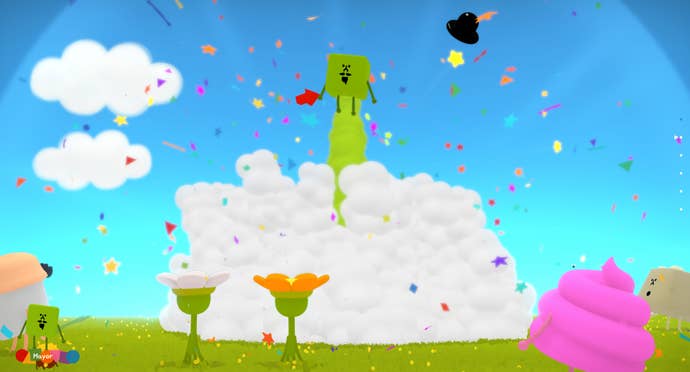
Even when disappointed by the world or by games he's excited for, his creative ideas have persisted in the face of a bleak society. Having kids in the years that followed Noby Noby Boy didn't change his ideology for making games at all, he tells me, because his ideas have pretty much been the same since he was creating things after art college. And with Wattam, he wants to connect the world. Like how players rallied around Noby Noby Boy, collectively earning enough points to help the character Girl "unite" the entire solar system and finally unlock its ending a whopping 2489 days after its initial release. That connectedness across borders, continents, oceans, cultures, and languages has always been inspiring for Takahashi.
That inspiration is the core of Wattam—not just making friends, but working together and having fun with friends. Sometimes, its speech bubbles will appear in different languages. Despite that, you're working together with cutely rendered mundane things, forging connections in holding hands with them, making towers by standing on them, and accomplishing the silly goals you're tasked with. It's also, surprisingly, pretty story-driven—sort of like the light framing around Katamari Damacy.
It's a quirky concept, but it's not dissimilar to Takahashi's past work. In Katamari, you roll up objects of the world as a lowly prince, which then get turned into stars by a big drunken giant better known as the King of Cosmos. In Noby Noby Boy, you stretch a Catdog-like critter as much as you want, accumulating points to aid Girl, who is trying to stretch to the Moon and beyond. In one of his lesser known games Alphabet, you can play it solo or with 26 other players—as many as the English alphabet. Wattam's explosion-making, nonsensical sensibility is right at home alongside Takahashi's other projects.
"I actually I like [Noby Noby Boy's] idea much better, much more than Katamari, because it's super challenging. My initial designs was I tried to make the game that you can keep playing forever," he says. He pauses before laughing. "Somehow."
It's a different perspective on the "forever" game than we're seeing in the likes of Destiny 2, Anthem, Rainbow Six Siege, and so on. Takahashi, rather than stuffing games with microtransactions and loot like triple-A publishers, is more concerned with a timeless experience.
He doesn't operate by the rules of typical game design either. When I ask Takahashi what he'd define a video game as, he hesitates. He doesn't have a definition, because there is none. Beyond his games, you can see the traces of the same vision that enamored people who played Katamari Damacy back on PlayStation 2 across most of his work—you can see it in his one-off, never publicly-released project Tenya Wanya Teens, in his AR experiment Woorld, or even in a blog where he doodled on real-life pictures everyday. While he isn't as active on the blog anymore—he cites Wattam development as the reason—it reflects Takahashi's constant playful mind.
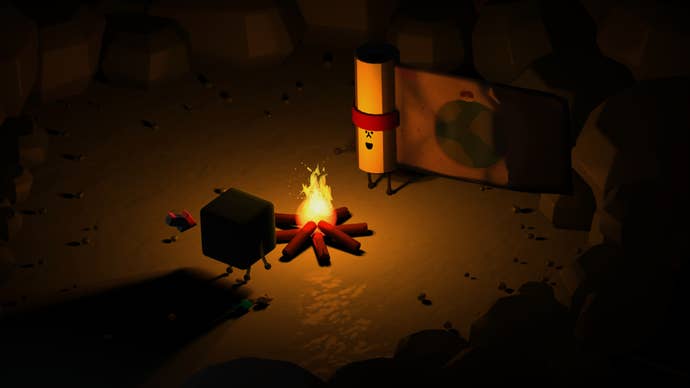
"Everything is same concept," he says. "So I try to draw something on the picture because we need more imagination, we should use more imagination. Even on the ordinary life, that makes you happy. [...] I know that drawing something on a picture is not a solution, but that's kind of the first step."
Wattam is due for release later this year through Annapurna Interactive on PlayStation 4 and PC. While Takahashi may come off as a pessimist, he also carries a lot of hope. A hope that in the future, game developers will take on "more modern" perspectives and make games focused on activities beyond "gathering items" and fighting. That future won't be immediate, of course. And in the interim, Takahashi's made peace with the fact that he nor games can change the world, but at least he can help bring people a little bit closer together.
Disclosure: USgamer is owned and operated by ReedPop, which also runs the PAX family of shows.


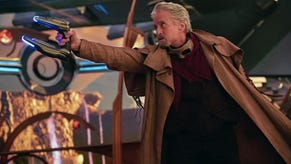
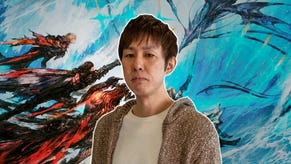


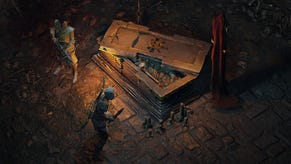
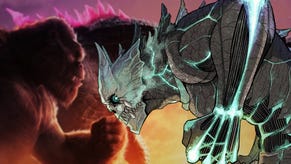
_ddwYK80.png?width=291&height=164&fit=crop&quality=80&format=jpg&auto=webp)
